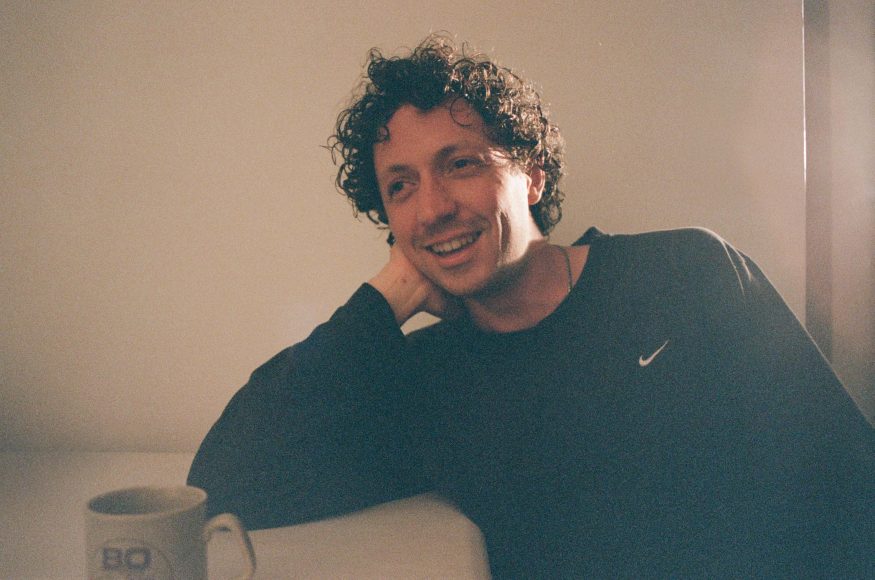
Liam Kazar
Biography
A pilot light is a small flame — an ignition source for a gas burner that traditionally stays permanently alight. For singer-songwriter Liam Kazar, it serves as a useful metaphor for love, even when the relationship has long since expired. Out of a glimmer also comes Liam’s long-awaited sophomore effort, the pensive and elegantly arranged Pilot Light.
It all starts on the album’s twinkling title track, which finds the Chicago-born, Brooklyn-based musician beginning to reckon with the end of a formative romantic connection: Love never goes, but it starts to hurt. “Grief never goes away, you just learn to live with it,” Liam says. “And I think that can be the same about heartbreak. There’s that flicker that’s always there.”
Arriving four years after his debut album, Due North, Pilot Light signals Liam’s reintroduction to the homegrown music industry that made him. Growing up in Chicago, Liam first started playing guitar and writing songs at just 13. As he came of age, Liam studied jazz in high school and toured consistently with his and friends’ bands, including childhood companion Spencer Tweedy’s. Seasoned show-goers might recognize him from his tours with everyone from Sam Evian to pop/r&b singer Hannah Cohen and Jeff Tweedy, among others. “It’s all led to me just going for it as a solo artist,” Liam says.
That collaborative spirit is infused throughout Pilot Light, which effortlessly moves between folk-rock, pop, jazz, and alt-country and features production by Sam Evian. Recorded at Evian’s Flying Cloud Studios in the Catskills and featuring artwork by Alexa Viscius, Pilot Light is technically a solo effort but goes down like a full-band project with contributions from Liam’s circle of friends: Hannah Cohen and Sima Cunningham on backing vocals, Sean Mullins on drums, and more seasoned players from Liam’s creative network.
Ruminative and heartfelt, Pilot Light represents Liam at his most unguarded as he takes the listener through the different stages of a relationship that has since come to an end, and peppers in a few more tracks that pull universal observations from daily life. “Pilot Light is a true breakup record, but songs are written from different timelines from when the relationship was going well, when it was struggling to find its footing, when it was ending, and after the breakup,” Liam explains. “I’ve gone through periods of being a very private person and keeping my cards close to the vest, and I’ve let go of all that. I think since the relationship I was in ended, I feel like being honest and being vulnerable has only brought me closer to people.”
Part of Liam’s more raw approach is reflected in Pilot Light’s spare, no-frills production, which strips out all reverb and in favor of a crisp, straightforward sonic style. “This was the first album I’ve ever been a part of where I just was trusting myself the whole way through,” Liam adds. “If it felt good to me, then that’s what we should go for. I like when you can hear everything that’s going on and you’re not hiding. To me, a straight up, dry type of sound is an honest, vulnerable thing to do.”
This unadorned sound springs to life on the standout sprightly stomper “The Word The War,” which rumbles in with quickened percussion and a jazz-influenced bassline that invokes Fleetwood Mac’s time-honored Tusk single “The Ledge.” As Liam ties together poetic lyrics that borrow from his daily chess habit (In a canopy of trees there’s a sleepless queen), the singer contemplates facade versus reality. “I feel like I’ve experienced a lot of people who are in very strong positions in the world or in their social status, yet they’re just as alone, just as vulnerable, just as insecure, just as unhappy with what they have as all the people below them,” he says.
Meanwhile, the twangy “Day Off” puts an alt-country twist on Pilot Light with a laid-back ode to playing hooky. “It was fun to imagine two people ditching work and having the perfect day together, casting all their worries, troubles, and capitalism aside, and saying, ‘Fuck it. Let’s go have fun,’” Liam says.
Finally, the warmly harmonizing folk-pop cut “Didn’t I” finds Liam remembering his late grandmother, Armina. “There’s loneliness at the end of someone’s life. Every time we’d say, ‘Goodbye, I love you,’ she would say, ‘I love you more,’” Liam recalls. “I wanted to write a song to remind my family that even if we couldn’t be with her every single second the last year of her life, she knew that we loved her, and she loves us more.”
Whether Liam is deconstructing a past relationship or contemplating everyday interpersonal dynamics, his poignant, intimate songwriting consistently positions him as a quiet musical force. Liam’s light might flicker, but it’s growing stronger by the second.
Video & Press
Album Review: Liam Kazar – Pilot Light
[The Indy Review] There’s something quietly reassuring about an artist who doesn’t rush to reinvent, but instead refines. That’s what Liam Kazar’s sophomore album Pilot Light feels like. Chicago-born, Brooklyn-based Kazar offers a warm continuation of his debut, Due North, only this time with a smarter production approach and deeper emotional footing. It’s the work of someone who knows his lane and […]